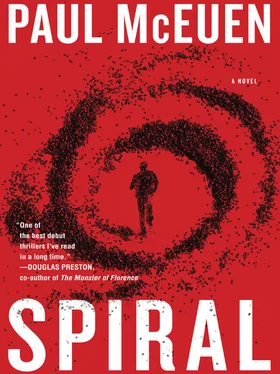“Yes.”
He took a deep breath, nodded slowly. “Then I suppose I believe it, too.”
DECIDING TO PULL VLAD INTO THIS MESS WAS NO EASY choice, but Jake and Maggie needed someone with access to a genetics lab. With the campus closed, they couldn’t get to the Cornell BioResource Center, the genetic sequencing facility that Maggie normally used. But Jake remembered that Vlad had a friend that ran a backyard genetics lab.
From the backseat, Vlad said, “My friend at DTRA—who said Dunne and Connor fought? He heard rumors about secret bioweapons project run out of USAMRIID and the USDA. Very tightly held. Now it makes sense. Maybe this is what Connor was so angry about. Must be some sort of countermeasures program.”
“Why would Liam be so upset about that?” Maggie asked.
“That is obvious,” Vlad said. “The principle of defensive asymmetry. Connor’s law, as invented by your grandfather in the fifties: you create a cure, you create a weapon.”
“I still don’t get it.”
“During the Vietnam War, we—meaning, the U.S. military—considered the covert use of smallpox on the North Vietnamese in Laos. Why? The Americans were vaccinated, the North Vietnamese were not. Smallpox was a viable weapon because we had the cure and the Vietnamese did not.”
Jake said, “Same with the Uzumaki. When the Japanese had it, before there was penicillin in Japan, they were safe. The Americans were not. But later, when the entire world used penicillin, everyone was vulnerable and the Uzumaki was no longer a weapon.”
“Correct,” Vlad said. “But if our scientists come up with a cure at Detrick—”
“Connor’s law,” Jake said. “It’s a weapon again. But this time a weapon controlled by us. As long as we are the only country with the cure.”
“Correct. Locked and loaded.”
Maggie shook her head. “This is insane. You really think Liam was worried about the U.S. using a biological weapon?”
“Absolutely,” Vlad said. “Connor saw it all, from the fifties to now. Not just Vietnam. One of plans for the invasion of Cuba called for a botulinum biological attack. At the time, chairman of the Joint Chiefs—Lyman Lemnitzer—argued like a madman for it. There were plans to get Castro with toxic fungus in his wet suit. We had a hundred operational scenarios.”
“But that was decades ago,” Maggie said.
“The world repeats. Strong becomes weak. Weak becomes strong. When scared, you do what you have to.”
“But who is strong enough to scare us ?”
“If you are Lawrence Dunne?” Jake said. “China. Dunne is a right-wing nut. His entire reputation is based on the Chinese threat. He’s convinced half the current administration that the Chinese will surpass us militarily by 2015.”
Maggie sat back, frowning. “But even if Liam knew all about the Uzumaki, he was opposed to Dunne’s scheme. It doesn’t tell us why that woman tortured him. What good would that knowledge do her ?”
“Maybe she works for the Guoanbu—Chinese security,” Vlad said. “They’d have no trouble believing the U.S. is developing a biological first-strike capability.”
“But we’re the good guys,” Maggie said, “aren’t we?”
Vlad grimly smiled. “We are supposed to be. Not everyone is.”
Maggie took a right turn and pulled into the parking lot of the Cornell Plant Pathology Herbarium.
“My home away from home,” Maggie said. “We used to be on the main campus, in the Plant Science Building, but we got pushed out. Hardly anybody cares about physical specimens anymore. It’s all about genomics.”
Jake got out and scanned the area as Maggie unlocked the front door. The building was set along a gravel road, surrounded by fields on three sides and woods behind. The isolation made him nervous. The soldier in him said that this would be a hell of a place to launch an ambush.
Vlad rolled out of the backseat. He lifted the cuff of his left pants leg and pulled out a snub-nosed pistol. “I’ll wait out here,” he said. “Put an eye out.”
THE RECEPTION AREA WAS BRIGHT AND FRIENDLY, WITH chairs and couches for visitors.
“Through here,” Maggie said, leading Jake to a door at the back. It opened into a large space, maybe forty feet wide and a hundred deep, filled with rows of dull brown metal cabinets. The place had a cold, industrial feel, with concrete floors and an odd smell.
“Homey,” Jake said.
“It wasn’t designed for this,” Maggie said. “They used to raise raptors in here. Last year, workmen came in and cleared out the cages, sandblasted the floors, and moved us in.” She knocked her knuckles against one of the cabinets, the sound echoing in the large space. “Each one of these contains thousands of fungal specimens, categorized by type. We’ve got over four hundred thousand overall.”
“A fungal mausoleum,” Jake said.
“That’s one way to see it, I suppose.”
Maggie led the way to a small lab equipped with microscopes and equipment for sample preparation and inspection. On a piece of white filter paper, she scraped off a few flecks of the luminescent fungus.
“You know how this goes? Do any molecular biology yourself?”
“Not really. I’m a silicon man.”
“It’s pretty straightforward. This is a commercial kit for extracting DNA. First I grind the fungus up in some buffer,” she said, using a mortar and pestle, “to break down the cells. Then I treat it with a series of chemicals that will strip off the proteins and release the DNA.
“We’re going fishing for what we call the GOM, or genetic owner’s manual, of the fungus,” Maggie said. “It’s an artificial stretch of DNA inserted into the genome. Liam always used GOMs when he tinkered with an organism—to tell you what genetic modifications were made, what they might do, and who made them. If you are going to mess with the molecular programming of an organism—”
“—you better be willing to sign your work,” Jake finished.
“So he told you about GOMs.”
“Only the basics.”
“Well, here’s the advanced course. All you need to recover the information are the short genetic sequences at the beginning and the end of the GOM, called primers. Which Liam hid in the letterbox instructions, the first and last letters. Once you have those, it’s easy,” she said. “Even a physicist could do it.”
Jake watched as she worked her way steadily through the extraction process. Her movements were spare and precise, nothing wasted. Jake got a strange feeling watching her, a kind of echo. Liam had worked exactly the same way.
“I’ve been thinking,” she said. “This Uzumaki fungus that the Japanese weaponized. It had to come from somewhere.”
“Meaning?”
“The Japanese didn’t just whip it up from scratch. They must’ve found it somewhere.”
“Maybe it was regional?” Jake said. “Endemic to Japan.”
“Not likely. Hosts and parasites evolve together. Liam said this was a corn fungus, correct? So if you want to find a corn fungus, you go to where corn came from—Mexico, South America. Now, here’s something interesting. My grandfather spent a lot of time in those areas. He was studying whether fungal spores could be spread by bird or butterfly migration—for example, monarchs fly thousands of miles from the U.S. to as far south as Mexico every year. But he never published anything on this. It always struck me as quixotic, all those trips. But maybe he was looking for something he wasn’t telling me about, something related to the Uzumaki.”
“So if he found something, you think he might have left the information about what it was encoded in the DNA here.”
“It’s possible.” Maggie held up a small microcentrifuge tube full of transparent liquid. “Done,” she said. “Ready for sequencing.”
Читать дальше












